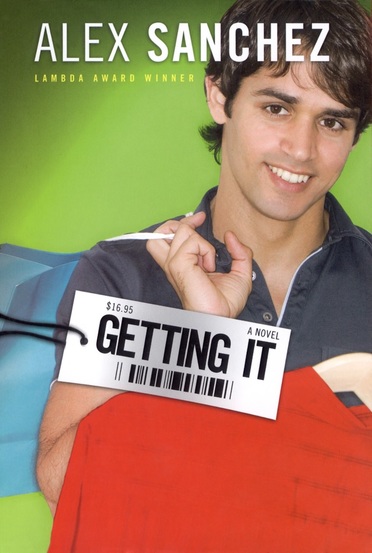










Carlos has a big problem: he feels like the only guy in his high school class who hasn't yet managed to hook up with a girl. While his closest friends seem to be born experts at making arrangements over the Internet and the whole "friends with benefits" scene, Carlos can barely manage even to strike up a text-message convo with the opposite sex. Furthermore, when it comes to Roxy, the girl that he most has his eye on, he is at a complete loss -- he gets as clumsy and tongue-tied as a seventh-grader.
After observing his classmates a bit, Carlos realizes that the one guy in his class who seems to feel at ease around girls and show some personal style is Sal. Despite not knowing Sal very well, Carlos hatches a plan to ask for his help. There's only one catch .. these rumors going around the school that Sal is gay. If Carlos starts to spend time around Sal, what will his friends think?
With "Getting It", author Alex Sanchez graduates from the middle-school setting of his previous book, "So Hard To Say", to the edgier, higher-stakes world of high school. With the change of setting comes not only characters who cope more directly with issues such as divorce, sexuality, and love, but the more "adult" situations where these issues play themselves out. It is remarkable how, within the obvious constraints of the young-adult genre, Sanchez manages to navigate this potentially dangerous territory with ease, including some sexually charged scenes without crossing the line into gratuitous detail.
At the center of the story is the "makeover" arrangement between Sal and Carlos. At first very guarded with Carlos, Sal accepts an hourly wage in exchange for his help with Roxy. At the same time he lets Carlos know that there's something more that he wants in return. Hearing this makes Carlos immediately wary himself, but it turns out that what Sal wants is a promise that Carlos will help him with a venture of his own -- the launch of a gay-straight alliance at the high school.
Carlos reluctantly agrees to Sal's conditions and the first part of the book explores how they slowly build a friendship over the course of the next few weeks. Sal helps Carlos with his conversation skills, his manners, his clothing style, even his bedroom decoration. Then, after they have attained a sense of mutual trust, on one particularly auspicious day Sal brings along his boyfriend to meet Carlos. For Carlos the result is even more insight into Sal's world, in addition to an even newer look thanks to an updated haircut and highlights.
As a result of Sal's expert advice Carlos gradually emerges as a new man. He starts to stand out to his classmates and his confidence level grows. His mom notices, his friends notice ... and, most importantly to him, Roxy starts to notice.
There are tough lessons to be learned, of course, and for Carlos this means that the book's title, "Getting It", takes on multiple meanings. Over time it occurs to Carlos that Sal has, in fact, become one of his most down-to-earth and trustworthy friends. As a result he begins not only to question his own assumptions about gay people but to see his other friends and family differently as well. His heightened sense of awareness has repercussions with various friends, including one who cannot seem to come to terms with Carlos's friendship with Sal and another who in fact might be gay himself.
The second part of the book finds Carlos's newly gained self-confidence fueling him toward a series of much dreamed-about encounters with Roxy, but in the time-honored tradition of "be careful what you wish for," the outcome is not quite what Carlos has been expecting. (In a welcome reversal of roles it is Carlos, the boy, who feels used by Roxy, the girl.) Furthermore, a crucial choice that he makes along the way ends up hurting Sal in a way that Carlos has known all along would be unforgivable, yet even as he drives head-on into his decision, he feels incapable of stopping. Sadly, once he gets his head together Carlos realizes that his obsession over "getting it" from Roxy might mean he has lost one of the best friends he's ever had. After disappointing Sal so badly, what could he possibly do to make it up to him?
One of the sub-plots of the book concerns Carlos's relationship with his father, who has remarried following a tense divorce from Carlos's mom and now has a second child with his new wife. Carlos resents how his weekend outings with his dad always seem to revolve more around his dad's new family than him, and for months he's been begrudgingly going along without saying anything. Sanchez effectively depicts how Carlos learns to apply Sal's principles of respect and honesty to his relationship with his father.
This is a terrific book. Sanchez once again captures the world of American youth with accuracy and energy, and his willingness to take on important issues of growing up is most welcome. The interaction and dialog between Carlos, his friends, and his parents is spot-on and totally believable. And, while there is indeed some content of a sexual nature, it is rendered more by alluding to the particulars than direct description, so most parents need not worry on that account.
It is refreshing to find a story for young adults that acknowledges their sexual reality while taking on the issues of what it means to truly be a friend. As a reader you really get to wishing the best for Carlos, so the book's hopeful ending will prompt a smile along with a likely touch of regret over the fact that it has to end at all.

